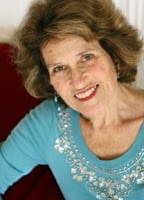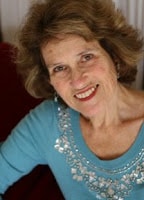Posts by Joan Price
“Best and Mightiest Aphrodite”
 Hey, this is so cool! I just received the “Best of the North Bay 2007” award for “Best and Mightiest Aphrodite” AKA “wrinkly sex kitten” by the North Bay Bohemian newspaper ! I love it!
Hey, this is so cool! I just received the “Best of the North Bay 2007” award for “Best and Mightiest Aphrodite” AKA “wrinkly sex kitten” by the North Bay Bohemian newspaper ! I love it!
This happened the same week I had cataract surgery. It all fits together, doesn’t it? 😉 Here’s the article:
The Bohemian’s
Best and Mightiest Aphrodite
If gaining entrance to the love-ins of the ’60s was contingent upon being mortal, Aphrodite would likely have traded in her spot on Mt. Olympus for a ticket. Some 40-odd years later, would this goddess-turned-mortal still be sexy? Somewhere after menopause, she’d probably have traded in her Botticelli curls for a Diane Sawyer coif. Popping Viagra, suitors would still come knocking to woo this now mature and wrinkly sex kitten.
Wrinkly sex kitten? Yeah, why not. Enter the world of Joan Price, who at 63 is pshawing the way that pop culture ridicules older people who still have sex. The Sebastopol resident has written Better Than I Ever Expected: Straight Talk About Sex After Sixty, which has become something of a bible for sextua-, septua- and octogenarians wanting to restore their sex lives. She’s packed the book with exercises to keep love muscles tuned up, testimonials by older women doing it and her own story about falling for the love of her life at age 57. This author-cheerleader has been touring throughout the country, giving workshops to women–and sometimes men–who are 50-plus and want to keep their sex drive alive. “When I do a workshop,” she says giggling, “it’s sort of an ice breaker the first time I say ‘lubricant’ or ‘vaginal tissue’ or ‘clitoris’ or ‘sex toy.'”
To Price, mature desire is not an oxymoron. In fact, she and her husband don’t see any reason why wisdom shouldn’t be sexy. “[My husband] sees wrinkles as sexy,” she says. “He sees an aging body and face, certainly, as extremely attractive, because they reflect what a woman has experienced and learned and given to the world and brought back to herself. Someone without them is sort of suspect.”
Price also has a popular blog, www.betterthanieverexpected.blogspot.com, where she and her readers discuss issues surrounding aging. In one recent post, Price brainstorms about different terms to describe older people: senior, elderly, mature, etc. She was prompted to write this post after reading a newspaper article that referred to a political conference attendee as a “little old lady.” Although the article wasn’t talking about her, per se, she took it as an affront to her demographic as a whole. On her blog, she quipped, “Don’t call me a little old lady . . . Call me Joan.” Whatever you call her, she’s our mighty, middle-aged Aphrodite.
Pole Dancing: Exploitative or Empowering?
I was quoted in today’s New York Times commenting on the trend that is bringing pole dancing (complete with instructors and portable, ceiling-high poles) into the homes of middle aged, middle class women, as well as into fitness studios. Here’s an excerpt from the article by Tina Kelley:
Some say exercise that echoes the acrobatics done by women who take their clothes off for a living is exploitative rather than empowering. But Ms. Shteir and Joan Price, the author of “Better Than I Ever Expected: Straight Talk About Sex After Sixty” (Seal Press, 2006), see a clear difference between middle-class, middle-aged women choosing to give parties in their homes and women pushed by poverty into potentially dangerous or demeaning work.
“If we were to limit what we do in the realm of affirming our sexuality because it has been used against us in the past,” said Ms. Price, who tried pole dancing in 2005, “we would then be buying into the idea that we don’t own it.”
The important point in the NYT article is that pole dancing, once solely the domain of strippers, has been reclaimed by women in all walks of life and of all ages. Why not? It’s a sensual activity that lets us see our bodies as sexy and alluring. We wrap around that pole as if it’s a lover. Pole dancing is also full of fun, healthy sexuality, fantasy, and good exercise –just try hanging onto that pole with your arms, your legs wrapped around the pole, your body suspended, and see if it’s a fitness challenge!
Besides pole dancing, women are flocking to fitness clubs for strip aerobics (we even saw this on Oprah), burlesque dance, and many other activities that “nice women” — especially of our age! — supposedly didn’t do.
Physical exercise itself is sexy, and we’re bringing the notion up a notch or two by indulging in a fitness activity that is decidedly and openly sexual.
I had the pleasure of experiencing a pole dancing class taught by Virginia Simpson-Magruder in 2005 as part of my research for an article for Marin County’s Pacific Sun about innovative exercise classes. Here’s what I said about it then:
“Push out your chest more,” Virginia Simpson-Magruder tells me in the Pole Dance class at Stage Dor Studio (10 Liberty Ship Way, Suite #340, Sausalito). Let’s see: butt out, chest out, look over shoulder, hip out, wrap leg around pole, swing–I never realized that pole dancing would require such strength and coordination. This sensual workout is much more than slithering around a pole–it strengthens the upper body (sometimes your arms are holding your whole body weight on the pole) and feels delightfully sensuous. Instructors Virginia Simpson-Magruder and Lane Driscoll got their training from a former exotic dancer. Yes, we used a real pole. (No, we didn’t strip.)
What do you think? Have you tried pole dancing, strip aerobics, or burlesque dance? What was your experience?
Gloria Steinem: Doing Sixty & Seventy
I was excited to see that Gloria Steinem has written a new book about aging, titled Doing Sixty & Seventy, and eagerly ordered it. When I saw the book — just 68 pages long and printed in a font about three times normal size, I felt cheated. It’s not a “book” — it’s a series of two essays published in hard cover. Once I got past that realization and read the essays, I was glad that I had.
Steinem, one of the most influencial feminist/activists of our time, was the founder of Ms. magazine. She became an inadvertent spokesperson for aging issues after a reporter said to her on her fortieth birthday, “You don’t look forty.”
Her widely quoted reply: “This is what forty looks like. We’ve been lying for so long, who would know?”
Steinem is now seventy-plus, and still radical. In fact, she claims that women get more radical as they age. This book includes her essay, “Doing Sixty,” plus “Into the Seventies,” a preface (which is actually an additional essay) looking back twelve years after writing “Doing Sixty.”
Some tidbits from these thought-provoking essays:
“I used to joke that I thought I was immortal and this caused me to plan poorly.”
“It was only after I’d become an old lady myself that I lost the habit of imposing my sentimental interpretation on old people.”
“For women especially – and for men too, if they’ve been limited by stereotpyes — we’ve traveled past the point when society cares very much about what we do… Though this neglect and invisibility may shock and grieve us greatly at first… it also creates a new freedom to be ourselves — without explanation.”
“I used to think that continuing my past sex life was the height of radicalism. After all, women too old for childbearing were supposed to be too old for sex. Becoming a pioneer dirty old lady seemed a worthwhile goal — which it was, for a while. But continuing the past even out of defiance is very different from progressing. Now I think: Why not take advantage of the hormonal changes that age provides to clear our minds, sharpen our senses, and free whole areas of our brains? Even as I celebrate past pleasures, I wonder: Did I sometimes confuse sex with aerobics?
I’d love to hear from you about any of these or related topics. Please chime in!
North Bay Bohemian: Birds, Bees, and Oldsters Do It
Thanks to Cole Porter, we know that birds do it, bees do it, even overeducated fleas do it. Well, apparently oldsters do it, too.
Happy Valentine’s Day! I was delighted to be profiled in the North Bay Bohemian‘s 2007 Sex Issue in a lively article by Brett Ascarelli titled “Certain Age.” Here are some excerpts:
Last fall, ABC Nightline sent a crew to Sebastopol to interview author Joan Price about seniors, sex and dating. Price, a former high school teacher turned fitness author and guru, fell in love a few years ago, drawing media attention when she claimed that she was having the best sex of her life. In 2006, she released Better Than I Ever Expected: Straight Talk About Sex After Sixty (Seal Press; $15.95), already in its second printing. The book features interviews with “sexually seasoned women,” experts’ advice about keeping the nethers in shape and Price’s own musings on the challenges of being a sexy senior. The book’s popularity spawned a related blog, in which Price moderates discussions about sex for the mature set.
One recent afternoon at her Sebastopol house, the 4’11” Price is wearing a rhinestone-covered blouse and Mary Janes. No wonder she’s getting some; at 63, she’s super-fit, thanks to a frequent work-out regimen and what must still be damn good metabolism, given the chocolate cookies she’s munching.
… Price is a poster-adult for the cause and now fields sex-related questions from mature adults at workshops across the country.
“I call myself an advocate for ageless sexuality,” Price laughs, “but maybe I’m trying to do more than that: I’m trying to change society one mind at a time, I guess.”
Ascarelli, a young woman, took to heart my comments about the need for society to change its ageist attitude toward sex. She quoted me saying, “I think it will be easier [for women in the future], especially if younger people pay attention to what we’re going through now and don’t see us as the Other, but just as themselves in a few decades.”
photo by Brett Ascarelli

